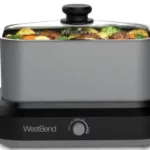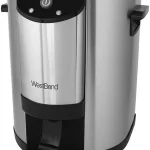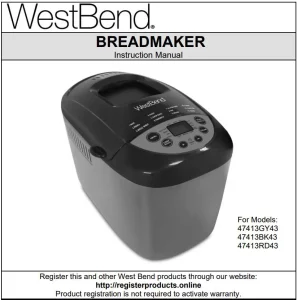
WestBend Breadmaker Instruction Manual
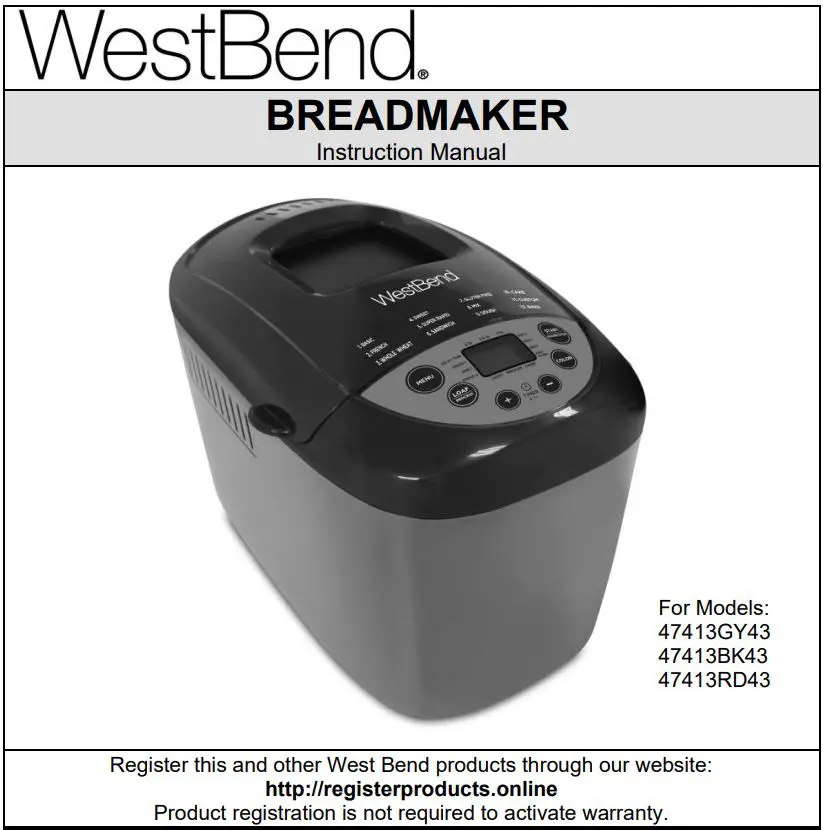
website: http://registerproducts.online
SAVE THIS INSTRUCTION MANUAL FOR FUTURE REFERENCE
© 2020 West Bend®
www.westbend.com
IMPORTANT SAFEGUARDS
![]() CAUTION
CAUTION
To prevent personal injury or property damage, read and follow all instructions and warnings.
When using electrical appliances, basic safety precautions should always be followed including the following:
- Read all instructions.
- Do not touch hot surfaces. Use handle or knobs. Always use hot pads or oven mitts when handling hot bread and bread pan.
- To protect against electric shock do not immerse cords, plugs, or other electric parts in water or other liquids.
- Close supervision is necessary when this appliance is used by or near children.
- Unplug the appliance from the outlet when not in use and before cleaning. Allow cooling before putting on or taking off parts.
- Do not operate any appliance with a damaged cord or plug or after the appliance malfunctions or if the appliance is dropped or damaged in any manner. If you experience any problems with your appliance, unplug it immediately from the electrical outlet. For service, information sees the warranty page.
- The use of accessory attachments not recommended by West Bend may cause fire, electric shock, or injury to persons.
- Do not use this appliance outdoors.
- Do not let the cord hang over the edge of a table or counter, or touch hot surfaces.
- Do not place on or near a hot gas or electric burner, or in a heated oven.
- Extreme caution must be used when moving an appliance during operation.
- To disconnect, turn control to “OFF,” then remove the plug from the wall outlet.
- Do not use appliances other than intended use.
- Avoid contacting moving parts.
- Do not let the cord contact hot surfaces, including the stove.
- This appliance has a polarized plug (one blade is wider than the other). To reduce the risk of electric shock, this plug is intended to fit into a polarized outlet only one way. If the plug does not fit fully into the outlet, reverse the plug. If it still does not fit, contact a qualified electrician. Do not attempt to modify the plugin anyway.
- Set bread pan on a hot pad, trivet, or another heat-protective surface. Do not set the hot bread pan directly on the counter, table, or another surface.
- Do not put your hand inside the oven chamber after the bread pan is removed. The heating unit will still be hot.
- Do not use your breadmaker with a converter or transformer. This will destroy the electronic controls.
- Do not attempt to repair this appliance yourself.
- A short power supply cord is provided to reduce risks resulting from becoming entangled in or tripping over a longer cord.
- Longer, detachable power-supply cords or extension cords are available and may be used if care is exercised in their use. While the use of an extension cord is not recommended, if you must use one, the marked electrical rating of the detachable power-supply cord or extension cord should be at least as great as the electrical rating of the appliance. If the appliance is of the grounded type, the extension cord should be a grounding-type 3-wire cord. The cord should be arranged so that it will not hang over the countertop or tabletop where it can be pulled by children or tripped over.
- For household use only.
SAVE THESE INSTRUCTIONS
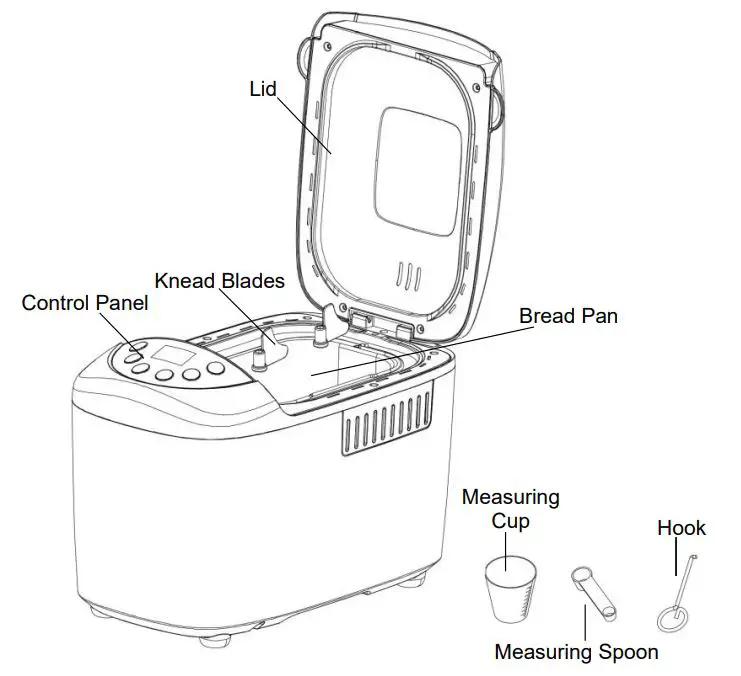
BEFORE USING IT FOR THE FIRST TIME
Check all packaging material carefully before discarding it. Accessory parts may be contained within the packaging material. Remove the plastic film from the display before use. Always clean your new appliance thoroughly before using it; refer to the “Cleaning Your Automatic Breadmaker” section of this manual. Before the first use, add a cup of water to the bread pan and place it in the baking chamber. Leaving the lid open, follow basic instructions to run the breadmaker on the (12) “Bake” setting for one full cycle to burn off any residual manufacturing oils.
Get to know your new West Bend® Breadmaker. The control panel on your breadmaker was designed to be very easy to use. Please review the following features to better understand the control panel.
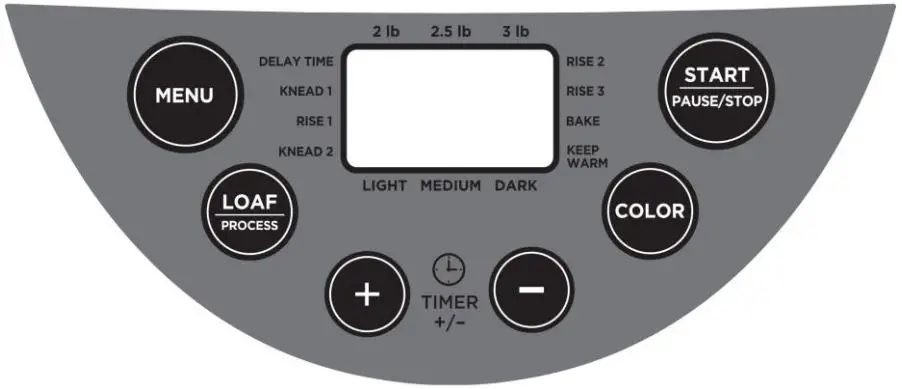
CONTROL PANEL and FUNCTIONS
LCD DISPLAY: The display indicates when the appliance is ready for use. When the appliance is first plugged in, there will be an audible beep and the default program is displayed. “1 3:05” appears on the display. The “1” specifies which program is selected (1-12 programs) and the “3:05” is the length of the program in an hour: minutes. The position of the arrow at the top of the display indicates the weight of the loaf selected (3, 2.5, or 2 lb) with 2.5 lb as the default. The position of the arrow at the bottom of the display indicates the degree of browning that is selected (light, medium, or dark) with the medium as the default. As the program proceeds, the digits of the time displayed will decrease progressively, indicating the remaining time. During operation, the status of the program is indicated in the display with a mark at the active program mode.
“START/STOP” Button: The “START/STOP” button is used to start, pause, or cancel a program. A short alert is heard with each press of the “START/STOP” button. Press this button when the Breadmaker is idle to start the program. When the breadmaker is active, press the button once to pause the program, or press and hold to cancel the program. If you do cancel the program, the breadmaker will return to its default settings for the chosen menu selection. All customized settings will be lost if the program is canceled. You must set all desired program settings before starting the program. The program cannot be changed after the cycle has begun unless you cancel the cycle.
“COLOR” Button: “COLOR” cycles to select the crust darkness: LIGHT, MEDIUM, and DARK. The default color is MEDIUM.
“TIMER” Buttons: The “+” and “-” buttons are used to set a delayed program end time. All settings, except (10) “Cake,” can be used with the delay timer. The delay hours and minutes will be added to the preprogrammed times for the specific program. The time indicated in the display is the time until the end of the cycle. The maximum time delay is 13 hours per program. Note: When delay start time has been selected, press the “START/STOP” button. As time counts down, the “: ” will blink to indicate that it is working. Setting (10) Cake cannot be used with a delayed start.
DELAY START:
The maximum time delay is 13 hours per program. Example: It is 8:30 p.m. and you would like the bread ready for the next morning at 7:00 a.m. Determine the time difference, 7:00 a.m. is 10 hours and 30 minutes ahead of 8:30 p.m. Press the “+” or “-” buttons until 10:30 appears in the display.
NEVER use the time delay function when using perishable ingredients such as milk, eggs, fruit, yogurt, etc.!
“LOAF / PROCESS” Button: The “LOAF” button adjusts the various programs for the selected loaf size; 3 lb, 2.5 lb, or 2 lb. This button is only applicable for the following programs: “Basic,” “French,” “Whole Wheat,” “Sweet,” “Super rapid,” “Sandwich,” “Gluten-free,” and “Cake.”
“MENU” Button: Use the “MENU” button to select the desired program. In general, use the following suggested programs for the following specialties.
MENU SELECTIONS
Menu 1: “Basic” for white, rye, potato, egg, garlic, and similar bread. The “Basic” setting can be used for almost any bread recipe containing mostly bread flour.
Menu 2: “French” for the preparation of particularly light white and Italian bread. This is not suitable for baking recipes requiring butter, margarine, or milk.
Menu 3: “Whole Wheat” for bread containing 50% or more whole wheat, cracked wheat, buttermilk wheat, and like bread.
Menu 4: “Sweet” for preparing bread with raisins, cinnamon, apricots, and similar ingredients.
Menu 5: “Super Rapid” for preparing loaves in under 2 hours. Menu 6: “Sandwich” for baking lightly textured bread with a thinner crust, perfect for at-home sandwiches.
Menu 7: “Gluten-Free” for Gluten-free recipes. Additional bake time on setting 12 may be necessary when baking some gluten-free bread. Always check gluten-free bread’s internal temperature with a thermometer to check doneness.
Menu 8: “Mix” for the preparation of doughs without yeast with no baking.
Menu 9: “Dough” for the preparation of dough with no baking.
Menu 10: “Cake” mix and bake; designed for use with boxed cake mixes and quick bread. Additional bake time on setting (12) Bake may be necessary when baking some cakes or quick bread.
Menu 11: “Custom” this program is for the baker who is very familiar with baking in a bread machine. This program allows for the complete personalization of making bread. The time of each cycle; knead, rise, bake and keep warm, can be customized. The settable time range of each program as following:
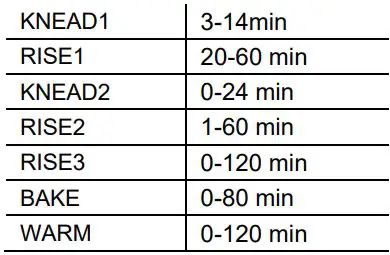
Please see the “Special Instructions for “CUSTOM” “ section for detailed instructions for using the “CUSTOM” function.
Menu 12: “Bake” for baking and browning of bread, cakes, or even casseroles. This setting is perfect for additional baking of bread that is too light or has not baked completely through. Bake time can be set in 10-minute increments, up to 1 hour. Press “LOAF / PROCESS,” then press the “+” or “-” buttons to increase or decrease bake time, then “START/STOP” to begin the cycle. In this program, there are no-knead or rest cycles.
ALERTS, SOUNDS, and OTHER GENERAL FUNCTIONS
Alert: The alert sounds:
- At the pressing of any button that allows function selection. If the button doesn’t beep, that function choice is not available.
- An alert of ten beeps may sound during the second kneading cycle of some settings to signal that the cereals, fruits, nuts, or other ingredients can be added.
- When the end of the program is reached.
- During the warming phase at the end of the baking procedure the alert sounds
several times.
Power Interruption: If there is a brief power interruption of fewer than ten minutes, the program position is stored in the memory and the machine will resume when the power is restored.
Over-temp Error: If the display shows “H: HH” after the program has been started, it means that the temperature inside of bread pan is too high. You should stop the program and unplug the power cord immediately. Open the lid and let the machine cool down completely before using it again.
- A small amount of smoke and/or odor may occur upon heating due to the release of manufacturing oils – this is normal.
- Some minor expansion/contraction sounds may occur during heating and cooling – this is normal.
BASIC STEPS IN MAKING BREAD
Always clean your new appliance thoroughly before using it. Refer to the “Cleaning Your Breadmaker” section.
- Position the knead blades onto the shafts in the bottom of the bread pan, matching the hub shapes with the shaft shapes. You may need to turn the blades slightly for the kneading blades to drop in place. Make sure the kneading blades are pushed down on the shaft all the way. The kneading blade is all the way down when the top of the shaft is flush with the top of the kneading blade.
- Add ingredients to the bread pan in the order listed in the recipe; liquids first, then the butter or margarine, next to the dry ingredients, and finally the yeast. For best results level the dry ingredients before adding the yeast. Note: Ingredients and measuring are the keys to successful breadmaking. We highly recommend reading the “Know Your Ingredients and Other Helpful Hints” section of this manual before making bread.
- Insert the bread pan; place the bread pan in the center of the baking chamber. Press gently on the bread pan to lock the pin into place. To remove the bread pan, pull with medium force on the bread pan carrying handle. CAUTION: The handle is hot after baking. Use oven mitts or hot pads when removing a hot bread pan.
- Close the lid. Plug the breadmaker cord into a 120 volt, AC electrical outlet ONLY.
- Use the “MENU” button to select the desired program menu. (see pg. 5)
- Use the “LOAF / PROCESS” button to select the desired loaf size.
- Use the “COLOR” button to select the desired crust darkness.
- If desired, use the TIMER “+” and “-” buttons to set the elapsed time for when the program is to be completed (see pg. 4).
- Press the “START/STOP” button to begin the program. After the breadmaker has been turned on, the programmed setting cannot be changed without canceling the program. To change the setting, hold the “START/STOP” button down until the alert sounds; program the control as desired and turn it back on.
- When the bread is done, an alert will sound. Turn the breadmaker off by holding the “START/STOP” button down until the alert sounds. Unplug the cord from the electrical outlet. If the breadmaker is not turned off after the cycle is complete, the breadmaker will automatically go into a one-hour “Keep Warm” period. If the machine is not turned off after the end of the “Keep Warm” period, the machine will turn itself off.
- Remove the bread pan. CAUTION: The handle is hot after baking. Use oven mitts or hot pads when removing a hot bread pan.
- Invert the bread pan and shake gently until the loaf falls out. Place the bread on a rack to cool for 15 to 20 minutes. The knead blades will normally stay in the bread pan when the bread is removed, but may on occasion slide out in the bread. If a kneading blade is inside the loaf, remove with the included hook before slicing. CAUTION: The kneading blade is very hot, remove with care. If making another loaf of bread right away, be sure the machine is turned off, unplugged, and allowed to cool for 15 to 20 minutes with the lid open.
Special Instructions for “CUSTOM”: The “CUSTOM” setting is perfect for the user who is familiar with the intricacies of making bread at home and wants to customize their own settings.
- Press the “LOAF / PROCESS” button once and “KNEAD1” will appear on the display; then press the TIMER “+” and “-” buttons to adjust the minutes. Press “LOAF / PROCESS” again to confirm the time for the first kneading cycle. Press “LOAF / PROCESS” again to advance to the next step. Note: To advance the time more rapidly, press and hold the TIMER “+” and “-” buttons.
- “RISE1” will now show on the display. Press the TIMER “+” and “-” buttons to adjust the minutes. Once the desired time has been set, press “LOAF / PROCESS” again to advance.
- Continue until you have customized all settings. Press “START/STOP” to exit programming, then press again to begin the cycle.
Note: Your breadmaker’s memory can remember your customized homemade settings unless power is lost for more than 5 minutes. When “CUSTOM” is first selected, the default setting is the same as BASIC.
High Altitude Adjustment: Reduced air pressure at high altitudes causes yeast gases to expand more rapidly and the dough to rise more quickly. The dough can rise so much that when it begins to bake, it will collapse due to overstretching of the gluten structure. To slow the rising of the dough, reduce the amount of yeast by ¼ teaspoon at a time until you find the right amount. You can also reduce the amount of liquid by a teaspoon or two. Some experimentation will be needed when using your breadmaker at high altitudes.
CLEANING YOUR BREADMAKER
- Unplug the cord from the electrical outlet and allow the appliance to cool completely before cleaning.
- After the bread is removed from the bread pan, and the pan has cooled, fill it half full with warm water and a small amount of dish soap. Allow the bread pan to soak for 5 to 20 minutes, or until the knead blades can be lifted off of the shafts. You may need to twist the knead blades slightly to loosen. If the kneading blades are difficult to remove after soaking, secure the crossbar on the underside of the bread pan while twisting the knead blades to loosen. Wash the inside of the bread pan and knead blades with a soft cloth, rinse and dry. Use a mild detergent. Never use chemical cleaning agents, oven cleaners, abrasive scouring pads, or cleansers on the bread pan or knead blades, as damage to the coating or finish can occur. Replace the knead blades on the shaft.
- Never immerse the bread pan in water or wash in an automatic dishwasher as damage to the bearing that turns the kneading blade can occur. Wipe the inside of the oven chamber and the outside surfaces of the breadmaker with a damp cloth if necessary. Never dip the appliance in water or fill the baking compartment with water! The lid cannot be removed for cleaning.
NOTE: The coating on the inside of the bread pan may change color over time; this is normal and does not affect the bread.
KNOW YOUR INGREDIENTS AND OTHER HELPFUL HINTS
Although bread making seems very basic, it is a science and the proportions of ingredients are critical. The most important step in using your bread maker is to measure the ingredients precisely and accurately. Read the following information to better understand the importance each ingredient plays in the bread-making process. Always make sure the ingredients are fresh.
- Measure the liquid ingredients in see-through measuring cups
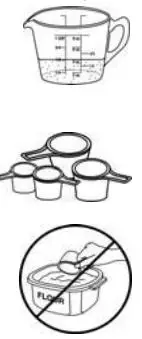 with accurate markings. Place the cup on a flat surface and measure at “Eye Level,” not at an angle. All measurements must be accurate. Always use liquids between 80-90°F (27-32°C) to assure optimal yeast activity.
with accurate markings. Place the cup on a flat surface and measure at “Eye Level,” not at an angle. All measurements must be accurate. Always use liquids between 80-90°F (27-32°C) to assure optimal yeast activity. - Spoon the dry ingredients into the appropriate measuring cups or spoons, and then level off with a table knife. All ingredients measured in measuring spoons and cups must be level, not rounded or heaping.
- Never scoop measuring cups into dry ingredients. This will compress the ingredients into the cup and cause the dough to be dry which will result in a short loaf of bread.
BREAD FLOUR should be used in your bread maker. It contains more gluten-forming proteins than all-purpose flour and will provide well-formed loaves with good structure. Several different brands of bread flour are available. Do not use self-rising or cake flour in your bread maker.
WHOLE WHEAT FLOUR can be used in your bread maker using the “Whole wheat” bread setting. Whole wheat flour contains the entire wheat kernel, including the bran and germ. Therefore, bread made with 100 percent or a high percentage of whole wheat flour will be lower in height and heavier in texture than bread made with bread flour. The “Whole wheat” setting on your bread maker is programmed to better develop the structure of wheat bread for optimum results.
RYE FLOUR can be used in combination with bread flour in the preparation of rye or pumpernickel bread. However, it cannot be used alone as it does not contain enough protein to develop adequate gluten for structure.
SUGAR AND OTHER SWEETENERS provide food for the yeast, add height and flavor to the bread and give the crust a golden color. Types of sweeteners that can be used include sugar, brown sugar, honey, molasses, maple syrup, corn syrup, and fruits, dried or fresh. Do not use artificial sweeteners as a substitute for sugars and other natural sweeteners; artificial sweeteners turn bitter when subjected to baking temperatures, the yeast will not react properly, and poor results will be attained. When measuring sticky sweeteners, such as honey, coat the measuring spoon with vegetable oil before measuring the sweetener. This will allow the sweetener to slide off the spoon without sticking.
MILK enhances flavor and increases the nutritional value of bread. Any type of milk; dry, whole, 2%, 1%, skim, buttermilk, or canned evaporated milk can be used in making bread. Refrigerated milk may be warmed to 80-90°F (27-32°C) however do not overheat (above 100°F, 38°C) as this could affect the yeast activity. Do not use regular milk when using the “Delay Start” function. Use dry milk and water as a substitute.
WATER used in combination with dry milk can be substituted for regular milk and must be used when using the “Delay Start” function as regular milk can spoil when left at room temperature for several hours. Use lukewarm water, about 80-90°F (2732°C). Do not use water above 100°F (38°C) as this could affect the yeast.
BUTTER, MARGARINE, SHORTENING, and OILS serve several purposes in bread making as they tenderize the bread, add flavor and richness. Butter and margarine are interchangeable in recipes. Butter and margarine can be used right from the refrigerator. Cut cold butter or margarine into smaller pieces for faster blending during the knead cycle. Low-fat or fat-free bread can be made by substituting equal amounts of unsweetened applesauce or plain yogurt for the amount of fat recommended in the recipe. Using less fat will affect the height, tenderness, and texture of the bread, which is normal.
EGGS adds color, richness, and leavening to bread. Use only large eggs. No premixing is needed. Egg substitutes can be used in place of fresh eggs. One egg equals ¼ cup of egg substitute. To reduce cholesterol, you can substitute two (2) egg whites for a large egg in the recipes without affecting the end result. Watch the dough during the knead cycle as some minor adjustments may be needed to get the dough to the right consistency.
SALT has several functions in making bread. It controls yeast growth while strengthening the gluten structure to make the dough more elastic and also adds flavor. Use ordinary table salt in your bread maker. Using too little or eliminating the salt will cause the dough to override. Using too much can prevent the dough from rising as high as it should. “Light” salt can be used as a substitute for ordinary table salt, providing it contains both potassium chloride and sodium. Use the same amount as recommended for table salt. When adding salt to the bread pan, add to one corner to keep it away from the yeast, especially when using time delay as the salt can affect the yeast activity.
YEAST is a living organism that, through fermentation, feeds on carbohydrates in flour and sugar to produce carbon dioxide gas that makes the bread rise. Active dry, fast-rising, or bread machine yeast can be used in your bread maker. Use only the amount stated in the recipes. Using a little more can cause the dough to override and bake into the top of the bread maker. Fast-rising yeast and bread machine yeast are virtually the same and interchangeable with one another. Do not use compressed yeast as poor results may be obtained. A ¼-ounce envelope of yeast contains 2¼ teaspoons. Yeast can also be purchased in bulk so you can measure the exact amount needed. Once opened, keep refrigerated. Always make sure yeast is fresh and has not passed the “Use By” date.
SPECIAL NOTE ON FLOUR: All flours are affected by growing conditions, milling, storage, humidity, etc. While not visibly different, you may need to make some minor adjustments when using different brands of flour as well as compensating for the humidity in your area. Always store bread flour in an airtight container. Store whole grain flours, whole wheat, and rye, in a refrigerator, to prevent them from becoming rancid. Measure the amount of flour as directed in each recipe, but make any adjustments after the first 3 – 4 minutes of continuous kneading. You may find you get better bread by weighing your flour rather than measuring in measuring cups. Most flours average 1 cup = 135 grams.
CHECKING THE DOUGH: Making changes to the dough is easy. This can be done during the knead cycle only. Do not turn off the breadmaker to adjust dough.
- Touch the dough. If it feels a little sticky and there is a slight smear of dough under the kneading blade, no adjustment is necessary.
- If the dough is very sticky, clinging to the sides of the pan, and is more like a batter than a dough, add one tablespoon of flour. Allow the flour to be mixed completely into the dough before making any more adjustments. To prevent heat from escaping, open the lid of the bread maker only to add flour.
- If the dough is dry and the bread maker appears to be laboring, add one teaspoon of lukewarm water. Allow water to be completely mixed into the dough before making any additional adjustments and keep the lid closed to keep heat in the appliance.
The dough is “just right” when it is smooth in appearance, soft to the touch, leaves a slight residue on your finger, and the bottom of the bread pan is clean of dough residue.
SPECIAL NOTE ON CINNAMON AND GARLIC: Adding too much cinnamon or garlic can affect the texture and size of the loaf obtained. Cinnamon can break down the structure of the dough, affecting height and texture. Too much garlic can inhibit yeast activity. Use only the amount of cinnamon and garlic recommended in the recipe.
CREATING ARTISAN BREAD CRUSTS: Just before the bread baking cycle begins, open the lid of the bread maker and carefully brush the top surface of the dough with a lightly beaten egg white that has been mixed with 1 teaspoon of water. If desired, slash the top of the dough ¼ to ½ inch deep with a sharp knife into desired design. Leave plain or sprinkle with seeds, herbs, grated parmesan or romano cheeses, or other desired toppings. Press toppings gently into the dough to ensure it adheres and will not fall off. Close the lid and allow the bread to bake. For best results, use only the beaten egg white with water to treat the crust before the bake cycle begins. This mixture will ensure that toppings will stick and not fall off when bread is removed from the pan. Do not use vegetable oil cooking sprays to treat crusts, as the cooking sprays can be
flammable when exposed to the bread maker’s heating unit. The crust can also be treated after the bread is done baking. Remove bread from the bread pan and place it on a rack. Lightly brush the top of the loaf with melted butter, margarine,
olive oil, or vegetable oil and sprinkle desired toppings onto the bread’s top.
GLUTEN-FREE BREAD: Always use room-temperature ingredients. Do not use eggs directly from the refrigerator. Instead, place them in a bowl of warm water until they reach room temperature. Gluten-free bread dough will have more of a muffin batter texture than a typical bread dough texture. This is normal. You may need to assist in mixing the ingredients in your bread pan with a rubber spatula. If you desire a lighter loaf of gluten-free bread, try beer bread or bread made with club soda or ginger ale.
HIGH ALTITUDE ADJUSTMENT: Reduced air pressure at high altitudes causes yeast gases to expand more rapidly and the dough to rise more quickly. The dough can rise so much that when it begins to bake, it will collapse due to overstretching of the gluten structure. To slow the rising of the dough, reduce the amount of yeast by ¼ teaspoon at a time until you find the right amount. You can also reduce the amount of liquid by a teaspoon or two. Some experimentation will be needed when using your breadmaker at high altitudes.
CHECK YOUR TEMPS: It is a good idea at the end of a bread cycle to check the internal temperature of your bread with a thermometer before removing the bread from the pan. Most bread is done when they reach 190°F-200°F. Gluten-free bread should be between 205°F-210°F. If you have not reached these temperatures, it is likely that your bread is underbaked. Bake for additional time on setting (12) Bake.
CYCLE TIME CHART: Please refer to the last page of this manual for a complete breakdown of each
TROUBLESHOOTING GUIDE
Review the following Problems, Possible Causes, and Solutions below.
GLUTEN-FREE TROUBLESHOOTING
Gluten-free breadmaking can be tricky. To prevent baking a dense brick of bread rather than a fluffy loaf, use these helpful tips.
- Use room-temperature ingredients, including eggs.
- Reverse the normal order of adding ingredients. Start with the yeast and dry
ingredients, add half the wet ingredients, and then start the cycle. Allow the ingredients to mix for several minutes and gradually add the remaining wet ingredients. - Observe the dough during the knead cycle. If the breadmaker has difficulty mixing ingredients thoroughly, use a spatula to scrape around the pan to assist.
- Use an instant-read thermometer to take the temperature of your bread before you remove it from the bread pan. If the internal temperature has not reached 205-210°F, your loaf will be underdone. Bake on the bake cycle for additional time, until internal temperature is between 205-210°F.
LOAF SIZE & SHAPE
Short loaves
- Wheat bread will be shorter than white bread due to less gluten-forming protein in whole-wheat flour.
- Not enough liquid – Increase liquid by 1-2 teaspoons.
- Sugar omitted or not enough added – Assemble ingredients as listed in the recipe.
- The wrong type of flour used – Do not use all-purpose flour.
- Not enough yeast used or too old – Measure amount recommended and check the freshness date on the package.
- The wrong type of yeast used – Use fast-rising or bread machine yeast. Do not use compressed yeast.
Flat loaves, no rising - Yeast omitted – Assemble ingredients as listed in the recipe.
- Yeast too old – Check the expiration date.
- Liquid too hot – Use lukewarm liquids 80-90°F (27-32°C).
- Too much salt added – Use the amount recommended in the recipe.
- Sugar or other sweetener omitted – Assemble ingredients as listed in the recipe.
Top and sides cave-in - Too much liquid Reduce liquid by 1-2 teaspoons.
- Too much yeast Use recommended amount.
Gnarly or knotted top, not smooth - Not enough liquid Increase liquid by 1-2 teaspoons.
- Too much flour Measure flour accurately, leveling off measuring cup.
Loaves uneven, shorter on one end - Dough too dry preventing even rise in bread pan Increase liquid by 1-2
teaspoons.
Collapsed while baking - May be caused from baking in high altitude Make adjustment for high altitude
baking by reducing yeast by ¼ teaspoon and reducing the liquid by 1-2 teaspoons.
BREAD TEXTURE
Heavy, dense texture
- Too much flour Measure accurately, leveling off measuring cup.
- Not enough yeast Add the recommended amount of yeast.
- Not enough sugar Add the recommended amount of sugar.
Open, coarse, or holey texture - Salt omitted Assemble ingredients as listed in the recipe.
- Too much yeast Add the recommended amount of yeast.
- Too much liquid Reduce liquid by 1-2 teaspoons.
Bread doesn’t slice well, very sticky - Sliced while too hot Allow bread to cool on a rack at least 15-20 minutes before slicing to release steam.
- Not using proper knife Use a good bread knife or electric knife.
Center of loaf raw, not baked through - Too much liquid Reduce liquid by 1-2 teaspoons.
- Power outage during operation If the power goes out during operation for longer than 5 minutes, the breadmaker will remain off when the power is restored. Remove the unbaked loaf from the bread pan and start over with fresh ingredients.
- Forgot to put knead blade in the bread pan Always make sure the kneading blade is on the shaft at bottom of the bread pan before adding ingredients.
CRUST and COLOR THICKNESS
Dark crust color/too thick
- Too much sugar Reduce sugar by half.
Loaf of bread is burned - Breadmaker is malfunctioning See Warranty page for service information.
Crust too light - Not enough sugar or fat Increase sugar or fat by half the amount recommended.
BREAD PAN PROBLEMS
Knead blade cannot be removed
- Add warm water to the bread pan and allow the kneading blade to soak before trying to remove it. Follow the cleaning instructions. You may need to twist the knead blade slightly after soaking to loosen. Do not immerse the bread pan in water.
Breadsticks to bread pan/difficult to shake out - Can happen over prolonged use Wipe the inside of the bread pan, from the ribs down with vegetable oil or solid shortening. Or add 1 tsp. vegetable oil to the liquid in the bread pan before adding dry ingredients. Do not use the vegetable spray as sticking can worsen. Or, let the bread sit in the bread pan for 10 minutes before shaking out. Replacement bread pans may be ordered. See Warranty section.
MACHINE MECHANICS
Ingredients not mixed
- Did not start machine After programming the control panel, press the “START/STOP” button to turn on.
- Forgot to put knead blade in the bread pan Always make sure the kneading blade is on the shaft in the bottom of the bread pan before adding ingredients.
Burning odor noted during operation
- Ingredients spilled inside the oven Be careful not to spill ingredients when adding to the bread pan as they will turn on the heating unit and cause smoke.
- Bread pan leaks Replacement bread pan may be ordered. See Warranty section.
- The exceeding capacity of bread pan Does not use more ingredients than recommended in the recipe and always measure accurately.
Machine unplugged by mistake or power lost during use for longer than 5 minutes. How can I save the bread?
- If the machine is in knead cycle, reprogram to the same bread setting and turn the machine back on.
- If the machine is in a rising or bake cycle, preheat a conventional oven to 350°F (177°C). Carefully remove the bread pan from the machine and bake on a rack in the center of the oven for 20-25 minutes or until golden brown.
Alert sounds, the display shows “H: HH” and the machine cannot be turned on.
- Breadmaker too hot to make consecutive loaves Unplug the cord from the outlet and allow to cool with the bread pan removed and lid open for 15-20 minutes. Plug the cord back in the outlet, add a bread pan and start the machine. If you are making consecutive loaves of bread, this error message is not uncommon and does not indicate a defect in the bread maker.
Alert sounds, the display shows “E: E0” and the machine cannot be turned on. - Breadmaker is malfunctioning See Warranty section for service information.
RECIPES
Pre-packaged bread mixes can be used in your breadmaker. Simply follow the instructions given for the specific bread mix. Unless otherwise stated for the bread mix, use the 2 lb. setting for loaf size. Follow standard practices; liquid ingredients into the bread pan first, then dry ingredients with the yeast, if required, going in last. Following are some made-from-scratch bread recipes to get you started. A supplemental recipe book is also available at www.westbend.com, in our care and use manuals section under support.
For All Settings: Add liquids to the bread pan first, then dry ingredients. Level the dry ingredients; quarter the butter or margarine and add to the corners. Make an impression in the center of the dry ingredients and add the yeast. Close the lid, select “Menu,” choose setting desired, select “Color,” then select “Loaf” to the size indicated in the recipe. Because of the many variables in bread making, we suggest checking the internal temperature of your bread with a thermometer before removing the bread from the pan at the end of the bread cycle. Most bread is done when they reach 190°F-200°F. Gluten-free bread should be between 205°F-210°F. If you have not reached these temperatures, it is likely that your bread is underbaked. Bake for additional time on setting (12) Bake.
BASIC
The following bread should be baked on setting 1, “Basic.”
Old Fashioned White Bread

Garlic Bread
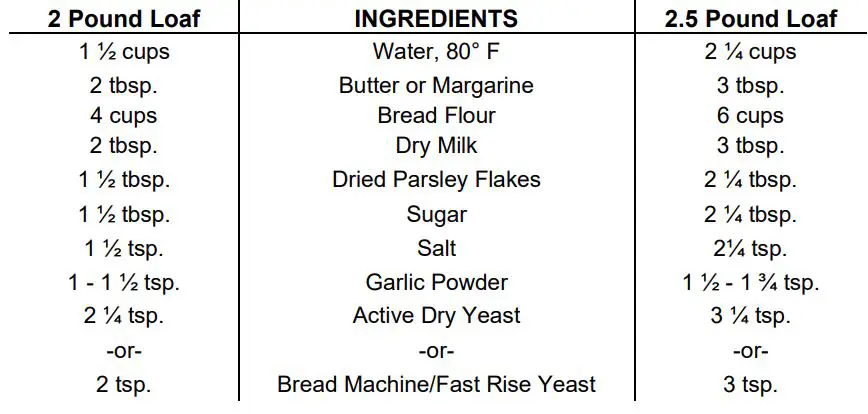
Walnut Bread
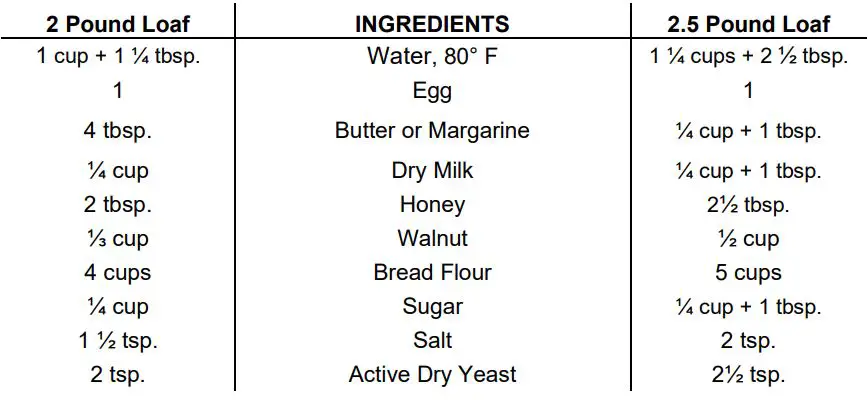
Classic Rye Bread
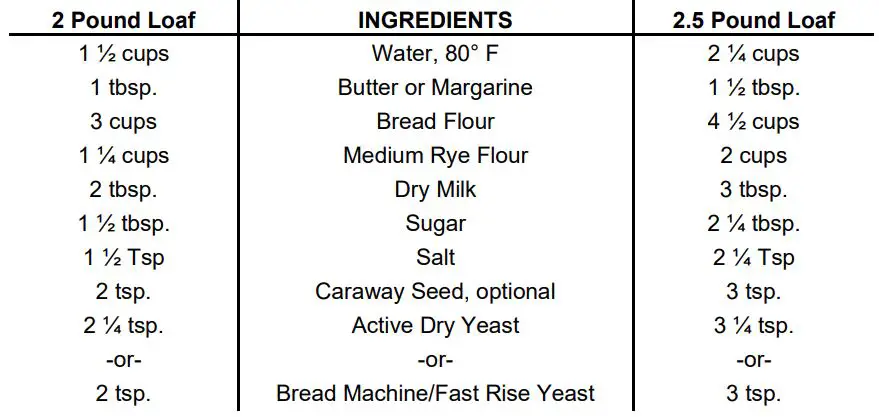
Sesame Bread
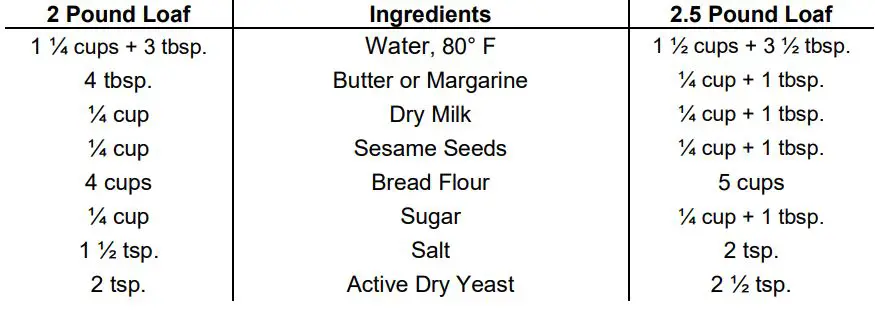
FRENCH
The following should be baked on setting 2, “French.”
French Bread

WHOLE WHEAT
The following recipes should be baked on setting 3, “Whole wheat.”
If the bread collapses during the baking period, add 1 or 1½ tablespoons vital wheat gluten to the recipe for respective loaf size to prevent this from happening. Vital wheat gluten can be found at most health food stores.
100% Whole Wheat Bread
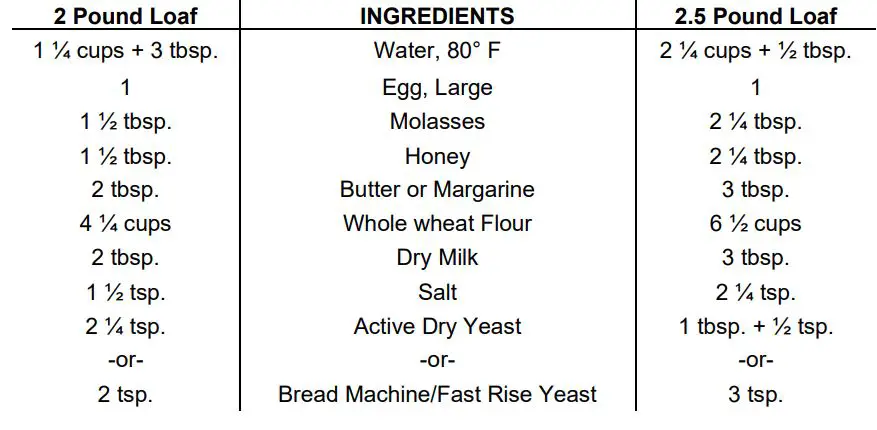
Wheat `N Yogurt Bread
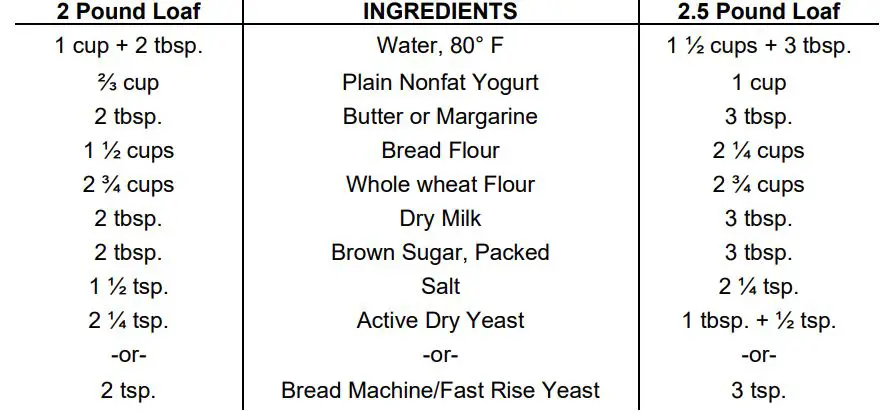
SWEET
The following recipes should be baked on setting 4, “Sweet.”
Nuts can be added at the sound of the alert, or at the beginning with the rest of the ingredients.
Oatmeal Maple Pecan Bread
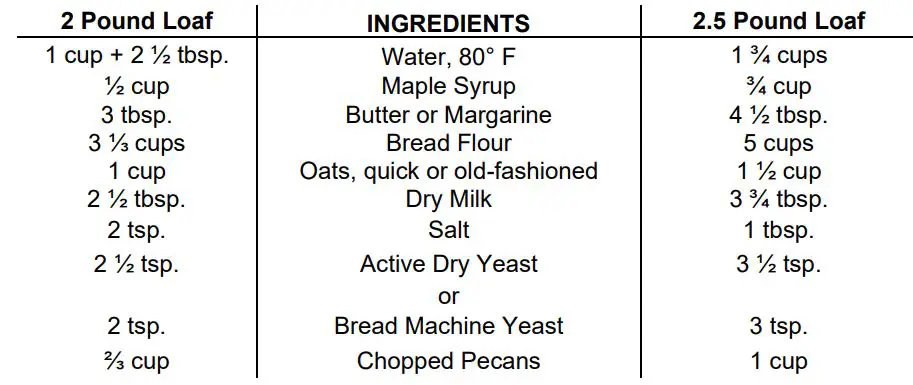
Raisin Bread
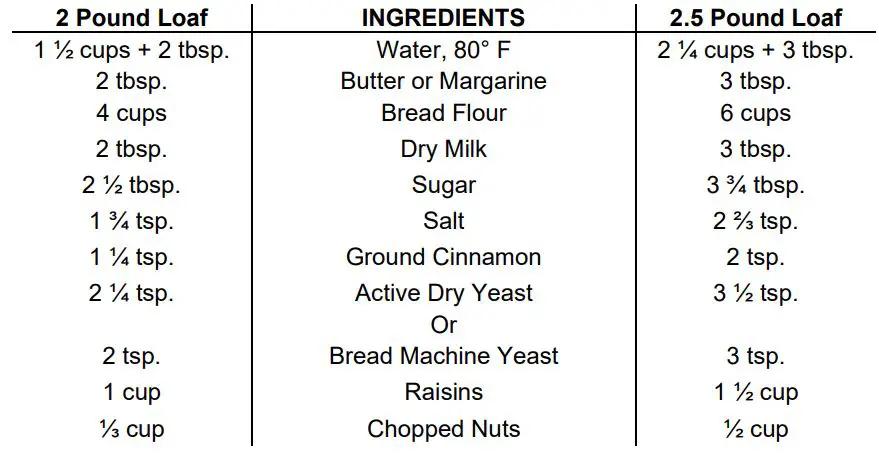
SUPER RAPID
For all of the following recipes, follow these general guidelines. The following should be baked on setting 5, “Super Rapid.” Many recipes can be converted to the Super rapid cycle. Use your recipe of choice and add an additional teaspoon of yeast for those recipes using yeast. DO NOT use any quick bread recipes in this setting.
Basic Super Rapid Bread
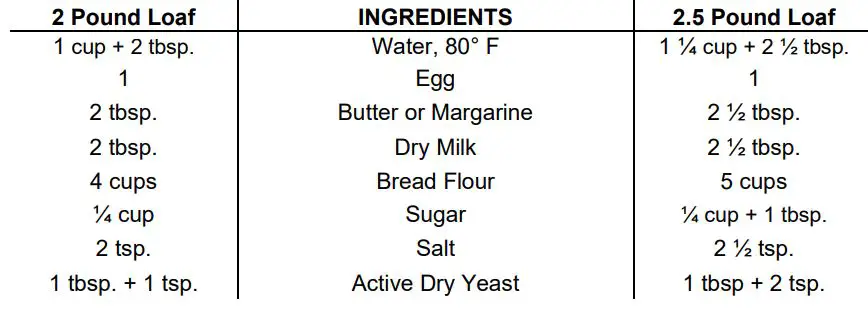
SANDWICH
The following recipe should be baked on setting 6, “Sandwich.”
Sandwich White Bread
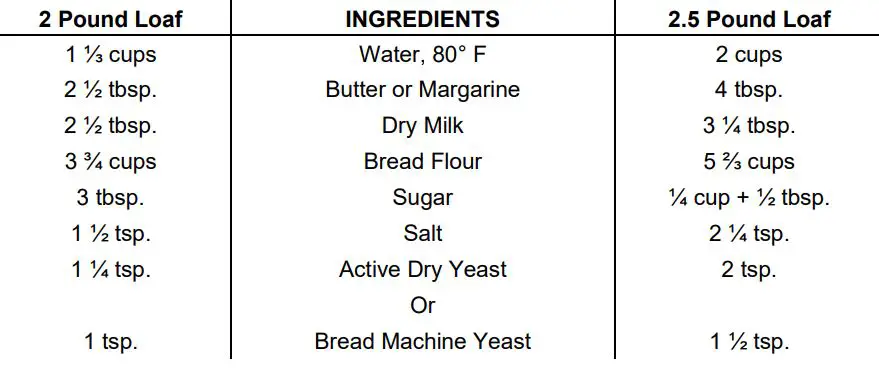
LOW CARB & GLUTEN-FREE
All Gluten-free and Low Carb bread should be baked on setting 7, “Gluten-Free” or setting 11, “Custom.” Gluten-free bread must first have liquid ingredients whisked together in a separate bowl to ensure proper blending. Break eggs into a 2-cup measuring cup and add the recommended amount of water before mixing in the liquid ingredients. Use room temperature ingredients, and if you notice issues with your loaves, reverse the normal order of adding ingredients. Start with the yeast and dry ingredients, add half the wet ingredients, and then start the cycle. Allow the ingredients to mix for several minutes and gradually add the remaining wet ingredients.
Gluten-free Bread
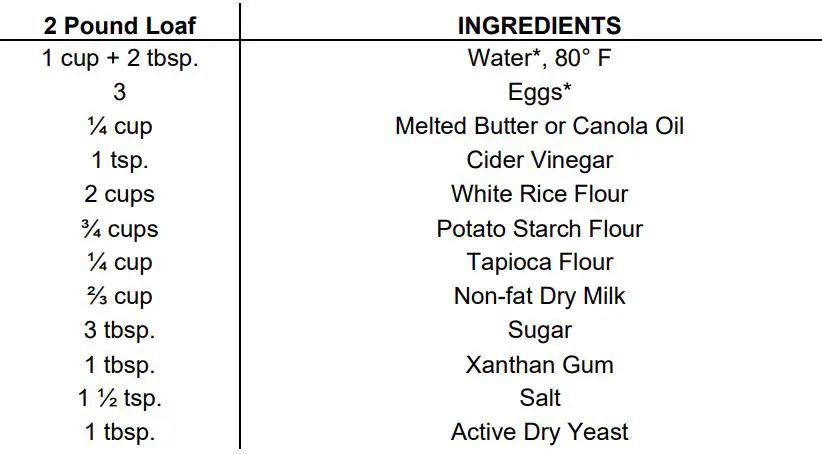
* Place eggs in measuring cup, then add water to the measuring cup, fill to 1 ¾ cup.
Lemon Poppyseed Gluten-free Bread
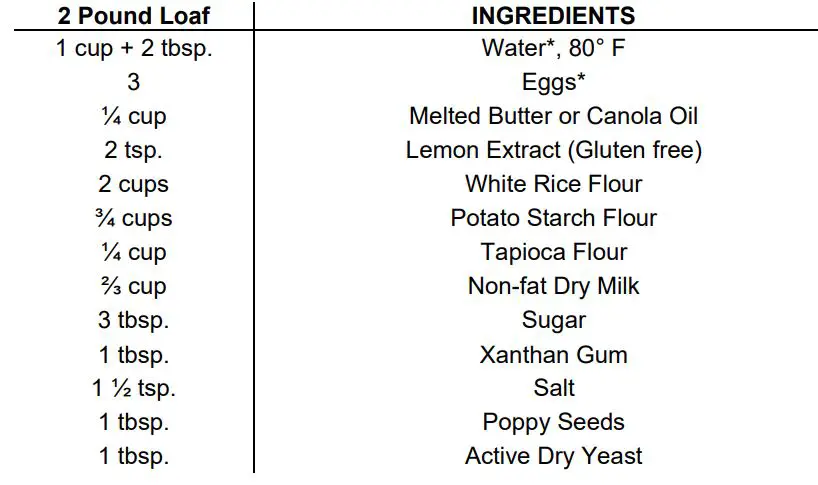
*Place eggs in measuring cup, then add water to the measuring cup, fill to 1 ¾ cup.
Whole Wheat & Seed Low Carb Bread
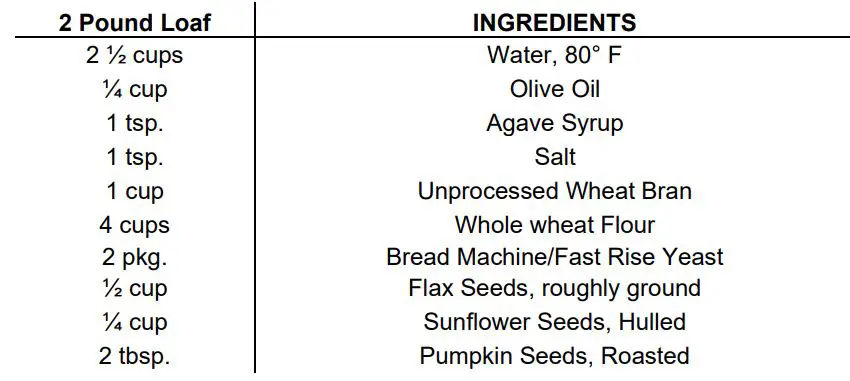
MIX
The following recipes should be baked on setting 8, “Mix.”
Basic Pasta Dough

After knead cycle has completed, remove the dough ball from the bread pan. Place in a plastic bag or under a damp towel to keep moist, and let rest for 30 minutes. Cut into quarters then roll thin through a pasta roller or use a rolling pin to roll to desired thickness.
DOUGH
The following recipes should be set to setting 9, “Dough.”
Pizza Dough
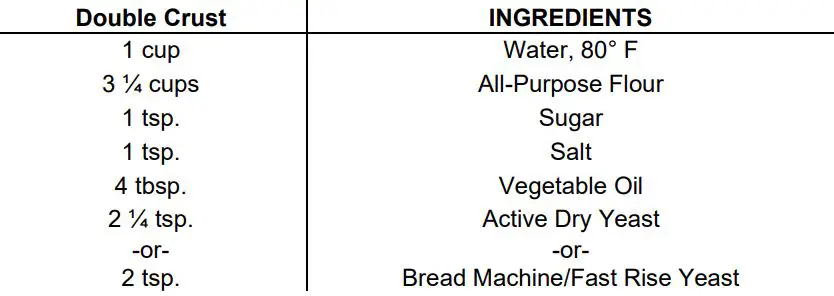
When the dough is done, turn the breadmaker off and remove the bread pan. Place the dough onto a floured surface. Knead for about 1 minute, then let rest for 15 minutes. Roll dough out to fit 12- or 14-inch pizza pans. Place dough on greased pan. If a crisper crust is desired, sprinkle the pan with cornmeal before placing the dough. Press the dough into the pans, forming an edge. Let the dough rise in a warm, draft-free place for 20 to 25 minutes. Spread pizza sauce evenly over crusts, then top with favorite meat, toppings, and shredded cheese. Bake in an oven, preheated to 425°F, for 20 to 25 minutes or until browned on top. Let rest 5 minutes before cutting.
Basic Dinner Rolls/Bread Sticks
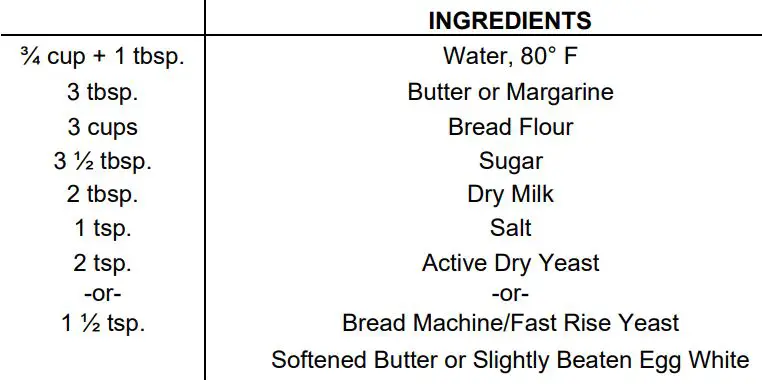
After the dough cycle has completed, remove the bread pan from the breadmaker and then remove the dough. Place dough onto a lightly floured surface for 15 minutes. Shape dough into a desired roll shape, place on a greased baking sheet, cover, and place in a warm, draft-free area for 45 minutes to rise. Once the dough has doubled in size, lightly brush the tops with butter or egg white and bake in a 350° F oven for 15-20 minutes, or until golden brown. Serve warm.
PRODUCT WARRANTY
Appliance 1 Year Limited Warranty
West Bend® (“the Company”) warrants this appliance from failures in the material and workmanship for one (1) year from the date of the original purchase with proof of purchase, provided that the appliance is operated and maintained in conformity with the Instruction Manual. Any failed part of the appliance will be repaired or replaced without charge at the Company’s discretion. This warranty applies to indoor household use only.
This warranty does not cover any damage, including discoloration, to any non-stick surface of the appliance. This warranty is null and void, as determined solely by the Company if the appliance is damaged through accident, misuse, abuse, negligence, scratching, or if the appliance is altered in any way.
THIS WARRANTY IS IN LIEU OF ALL IMPLIED WARRANTIES, INCLUDING WARRANTIES OF MERCHANTABILITY, FITNESS FOR A PARTICULAR PURPOSE, PERFORMANCE, OR OTHERWISE, WHICH ARE HEREBY EXCLUDED. IN NO EVENT SHALL THE COMPANY BE LIABLE FOR ANY DAMAGES, WHETHER DIRECT, INDIRECT, INCIDENTAL, FORESEEABLE, CONSEQUENTIAL, OR SPECIAL ARISING OUT OF OR IN CONNECTION WITH THIS APPLIANCE.
If you think the appliance has failed or requires service within its warranty period, please contact the Customer Care Department at (888) 610-0498, or e-mail us at [email protected]. A receipt proving the original purchase date will be required for all warranty claims, handwritten receipts are not accepted. You may also be required to return the appliance for inspection and evaluation. Return shipping costs are not refundable. The Company is not responsible for returns lost in transit.
Valid only in USA and Canada
REPLACEMENT PARTS
Replacement parts, if available, may be ordered directly from the Company in several ways. Order online at www.westbend.com, e-mail [email protected], or over the phone by calling (888) 610-0498
To order with a check or money order, please first contact Customer Care for an order total. Mail your payment along with a letter stating the model or catalog number of your appliance, which can be found on the bottom or back of the appliance, a description of the part or parts you are ordering, and the quantity you would like.
Your state/province’s sales tax and a shipping fee will be added to your total charge. Please allow two weeks for processing and delivery.
This manual contains important and helpful information regarding the safe use and care of your product. For future reference, attach dated sales receipt for warranty proof of purchase and record the following information:
Date purchased or received as gift: _______________________________________________
Where purchased and price, if known: _____________________________________________
Item number and Date Code (shown bottom/back of product):___________________________
